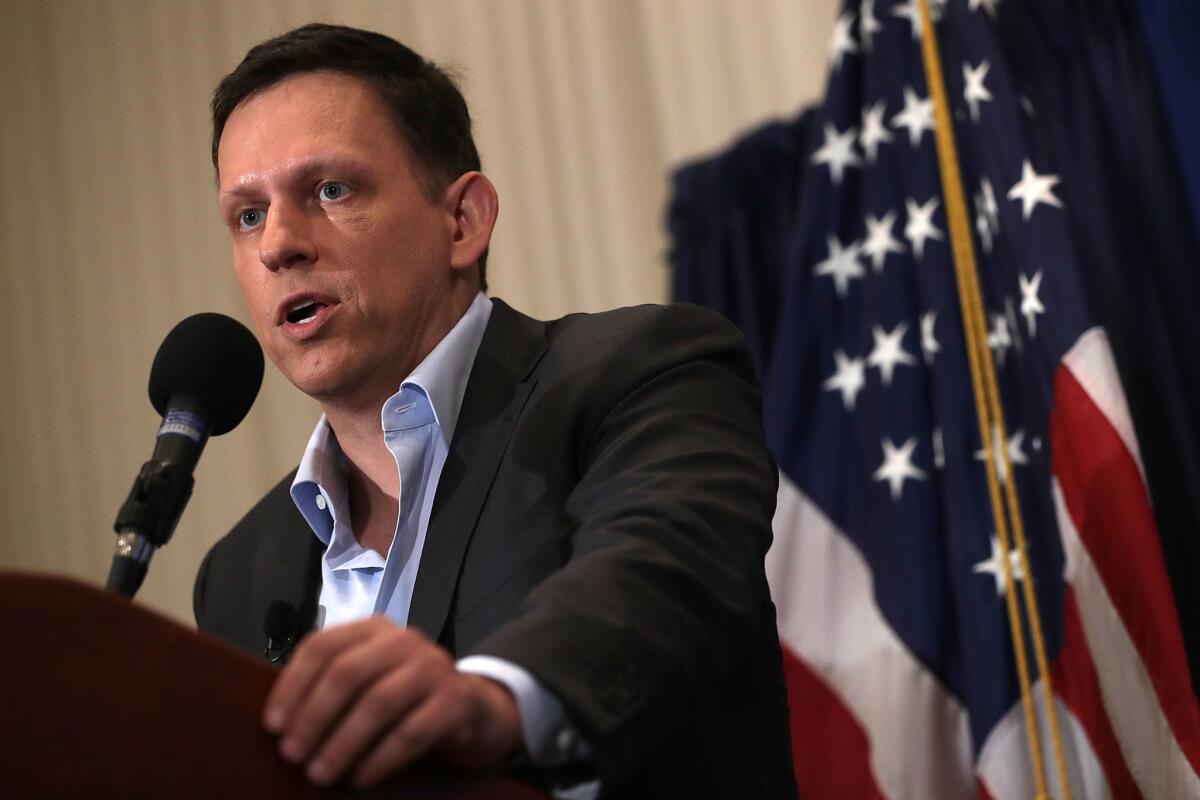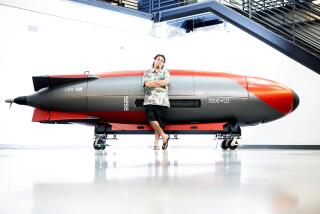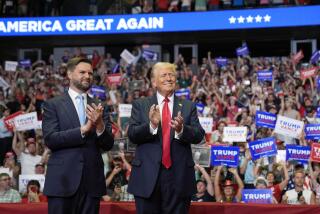Peter Thiel missed out on China. Now he’s betting on American patriotism

Peter Thiel is a self-described contrarian. This philosophy worked well when he helped establish an online bank — PayPal — at a time few people trusted anything on the internet and, more recently, with his bet on the ultimate long-shot presidential candidate, Donald Trump. Understanding where his latest gambit, a very public rebuke of the world’s second-largest economy, fits into this strategy is as complex as his belief system.
In a pair of recent public appearances, Thiel diverged from virtually everyone in the global business community by stoking anti-China sentiment and goading the Trump administration to intensify the trade war. Thiel can take this position because, either by accident or by design, the Chinese economy is largely irrelevant to his business interests.
Thiel’s network of venture capital and personal funds manages more than $7 billion and has bet on hundreds of startups. Of those, there are only three known investments in Chinese companies, according to a study by market research firm PitchBook commissioned by Bloomberg. The most recent was in a small Beijing biotech startup early this year. None of the companies appears to be thriving.
Anduril’s Palmer Luckey thinks Big Tech should put America first
Depending on how you look at it, Thiel’s new Chinese offensive is a bitter response to missing the investment opportunity of the decade or a brilliant long game that’s finally coming to a climax. His protectionist rhetoric, in which he accused Google of “seemingly treasonous” collaborations with the Chinese government, initially won plaudits from President Trump and could return benefits to his companies. A spokesman for Thiel declined to comment.
Three of Thiel’s most promising investments — Elon Musk’s SpaceX, data mining company Palantir Technologies Inc. and border security provider Anduril Industries Inc. — rely heavily on U.S. contracts. Those deals have grown in size, and the companies now supply critical capabilities to the nation’s defense and military complex.
Although federal contract approvals are supposed to be an objective process, emotional appeals and a sense of patriotism can have an effect, said Mike Hermus, a former technology chief for the Homeland Security Department. “The people who make decisions are still human,” he said. “People can only compartmentalize so much.”
Thiel didn’t always look on China with scorn. He once viewed it as an economic wonder and characterized its rise as “the most important political trend of the new millennium.” In a 2008 essay for Stanford University’s Hoover Institution, a public policy think tank, Thiel wrote: “There is no good scenario for the world in which China fails.” By 2014, his curiosity took on a dismissive tone. In his book “Zero to One,” he wrote that Chinese technologists simply copied ideas from the West.
A persistent view Thiel has held is that China doesn’t make it easy for foreigners to buy a stake in the country’s prosperity. “I suspect we are underestimating China, but it may be very hard to invest,” he told economist Tyler Cowen in 2015. In the meantime, several of his peers found ways in. Yuri Milner’s DST Global and Sequoia Capital have been backing Chinese startups for a decade or more, with bets on the likes of Alibaba Group Holding Ltd., JD.com Inc. and Xiaomi Corp. that proved to be incredibly lucrative.
Thiel’s picks, meanwhile, haven’t become household names on the mainland. He invested $180,000 a decade ago in a Shanghai market intelligence startup called Business Connect China, said a spokeswoman for his venture firm Founders Fund. (She disputed that Business Connect China is a Chinese company because it’s incorporated in the Cayman Islands.) According to PitchBook research, Thiel bought an undisclosed amount of stock in Beijing’s Genome Precision in 2016. And this year’s investment was in Immunochina, which has raised less than $30 million from half a dozen backers including Thiel to develop cancer treatments.
As recently as last year, Thiel was still contemplating how to break into China. He evaluated various options, including partnering with local venture firms, people familiar with the conversations said at the time. Those talks never progressed, some of those people now say. It’s essentially too late, said Helen Wong, a partner at Qiming Venture Partners. Today’s market is highly competitive and leaves little room for an outsider, she said: “China is one of the two largest tech ecosystems in the world.”
The new contrarian strategy, it seems, is to turn a weak business record in China into an asset. By targeting Google with his unsubstantiated claim last month, Thiel suggested associations with Beijing should be a disqualifier for a U.S. contractor. Trump at first entertained the idea, promising in a tweet that the White House would look into Thiel’s claims of treason and calling him “a great and brilliant guy.” The sideshow appeared to temporarily take heat off Facebook Inc., where Thiel is a board member. But Google denied the claims, and Treasury Secretary Steven T. Mnuchin said last week that they found no security concerns.
Some in Thiel’s orbit said the venture capitalist’s concerns are authentic. “He’s a very patriotic guy,” said John Meyer, who received a grant from Thiel’s fellowship program to start a company in lieu of attending college. “If Google is building an AI office in Beijing and hiring a ton of AI engineers there, that means it’s working with the Chinese government in some way. He’s worried about that.”
Thiel’s stance could also win him fans in Washington. The three major U.S. contractors in which he holds stakes have at times echoed Thiel’s message of American loyalty. They have a lot of money riding on federal spending.
Just this year, SpaceX has won more than $350 million from the Air Force, Defense Department and NASA. Palantir, which counts Thiel as a founder and chairman, secured a contract worth more than $800 million from the Army in March and another in July from the Defense Department for $144 million.
In the second agreement, which hasn’t been previously reported, Palantir will supply software to intelligence agencies and the Coast Guard over four years. This deal was particularly significant because it wasn’t open to competing bids and established Palantir as a “brand name” federal provider of defense technology, in the same league as Microsoft Corp. and Oracle Corp. The designation can set a precedent, said Meagan Metzger, who runs the Washington-based Dcode accelerator, which consults with tech companies on federal contracting. “When you do a brand name contract of that size, you have to get a bunch of approvals up the chain,” she said. “That’s a huge award.”
The newest addition to Thiel’s portfolio of government suppliers is digital surveillance company Anduril. Palmer Luckey, founder of the Facebook-owned virtual-reality headset Oculus, runs the business, which, like Palantir, takes its name from the lore of the book series “The Lord of the Rings,” which Thiel loved. Anduril is staffed by more than a dozen Palantir veterans and funded largely by Thiel’s Founders Fund.
Anduril has gained significant traction inside the U.S. government in the two years since it started operating. The startup quietly took over the military’s Project Maven this year, according to a news report in the Intercept, after Google faced employee protests and abandoned the effort. Anduril also secured a $13.5-million contract with the U.S. Marine Corps to provide autonomous surveillance towers on the border and at military bases, according to documents surfaced in July by worker advocacy group Mijente.
Thiel’s love of country is being embraced throughout his empire. One of the newest additions to the Founders Fund investing team, Delian Asparouhov, posted a photo on Twitter on July 17 showing the office decor set to commemorate a visit from Luckey to discuss Anduril. A U.S. flag was draped across a white board in the conference room, as he held a red, white and blue napkin emblazoned with the words, “USA all day.”
More to Read
Inside the business of entertainment
The Wide Shot brings you news, analysis and insights on everything from streaming wars to production — and what it all means for the future.
You may occasionally receive promotional content from the Los Angeles Times.










